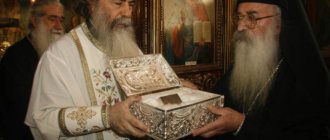The book of the prophet Malachi is the last book of the prophetic Old Testament cycle and the last book of the entire Old Testament. The ministry of the prophet Malachi occurred in the 5th century BC. e. this was a hundred years after the repatriation of the Jews from Babylonian captivity. In Malachi's day, the construction of the Second Temple was already completed. The houses and the city wall were restored.
However, the life of God's chosen people did not become easier. The Jews were subordinate to the Persians. The difficult social and political situation was the reason that many lost faith not only in the fact that the Jewish people were God's chosen ones, but also in the very fact of the existence of one God. In this regard, the Law of Moses and the commandments of God were often violated. Even among the priests there was a sense of decadence. Moral laxity reigned in society, and marriages with pagans were common.
Historical setting.
Malachi's ministry dates back to the 5th century BC. About a hundred years passed after Cyrus issued his decree allowing the Jews to return to their land (538 BC), when the prophetic speeches of Malachi, the author of the last book of the Old Testament, were heard Testament. The ministry of the two prophets who preceded him, Haggai and Zechariah, greatly contributed to the restoration of the temple by the Jews in 515. Residential buildings in Jerusalem were also restored. Most likely, already in the days of Malachi the city wall was rebuilt.
But life for the returnees was not easy. The Jews were politically subordinate to the Persians. The word "pekhah", transmitted in Russian to Mal. 1:8 as "prince", and elsewhere as "governor" (Ezra 5:3,6,14; 6:6-7,13), was a Persian title for governor. The harvests were poor in the fields that were attacked by locusts (Mal. 3:11). The hearts of the returnees were increasingly dominated by indifference to God or “resentment” towards Him. They lost faith in the chosenness of Israel and, accordingly, became increasingly indifferent to the temple and to the sacrifices.
Increasingly, they violated the provisions of the Mosaic Law regarding sacrifices and tithes, not only the laity, but also the priests. The fact that the Jews’ hopes for the “promises of the covenant” were fading was evidenced by their marriages with pagans, for whom they abandoned their wives, and by the general moral laxity in society.
Chapter 1
Malachi prophesies upon the return of the Jews from captivity and proclaims that God loved the sons of Jacob and hated the sons of Esau.
Although all the prophets predicted the death of Idumea, Malachi alone prophesies about its destruction at the very time of its destruction.
And then he adds:
Idumea in the days of Malachi underwent that final destruction, which other prophets had foretold for many generations. The Lord will be magnified above the borders of Israel; the Lord will be glorified throughout all the borders of Israel. But the prophet foresees that the boundaries of the Judean possessions will be expanded, and this will be accomplished through the labors of Judah Maccabee and the people’s rulers who came after him, who took possession of many countries, also conquered the land of Idumea, and the Edomites themselves were forced to abandon their laws and observe the customs and laws of Israel.
God denounces the Jews, despisers of His name and holiness, saying that His name is glorified by the nations who heard and saw the signs and wonders that He performed for their deliverance in Egypt and among the nations whose lands they inherited; everyone trembles at Him and glorifies His name, but they defile Him, showing disdain in deeds and words,
saying: The table of the Lord is profaned, and His meats are despised.
Do not defile My altars any more by sacrificing blind and lame animals, for you truly offer such sacrifices to Me.
because they were not bought with price, but acquired by theft. If your prince does not accept such offerings from you, even those not taken from his property, then will I accept from you such sacrifices that you make from My property? Therefore, I will reject such sacrifices as obscene, “and I will blow” (Mal. 1:13) them into your faces as uncleanness.
In the allegorical sense, the one who brings the blind is the one who, although he gives alms, adheres to heresy; the one who brings the lame is the one who brings gifts and offerings to God from a pure heart, but is agitated by thoughts, either wanting to bring a gift to God, or coming up with a reason why not to make this offering, or, if he gave something as a gift, he repents that gave; Those who bring ill things are likened to people whose souls are sick with love of glory, and who, while doing good, are constantly concerned about receiving praise and glory from people for their deeds. Our Lord also rejects such sacrifices in the Gospel, calling those who offer them hypocrites (Matthew 23).
Those who make such a sacrifice are likened to people who, according to the strength of their strength, should seek heavenly glory for the soul, but they turn their spiritual strength to worldly concerns, while they feel powerless and disgust towards spiritual work, and neglect piety and virtue. Such people are likened to Cain, who himself devoured (tasted) the best, and brought to God the crumbs that remained surplus to him.
Source
Time to write.
As already mentioned, the prophet Malachi lived in the 5th century BC, in Judea, which was part of the Persian kingdom. Most researchers agree that his book was written between 450 and 430 BC. Here are the arguments in favor of this opinion: 1) Malachi’s reproaches against the priests who violated the rules of serving in the temple undoubtedly indicate that the temple and the priesthood had by that time been restored. 2) Everything that the prophet says about the state of society, both moral and spiritual, is very consistent with the denunciations of Ezra, who returned in 458, and Nehemiah, who returned from a foreign land in 444 BC.
Both Ezra, Nehemiah, and Malachi are indignant about the marriages of Jews with pagans (compare Mal. 2:10-11 with Ezra 9:1-2 and Neh. 13:1-3,23-28), reproaching the people for unwilling to support the Levites (Mal. 3:10; cf. Neh. 13:10), they are outraged by the oppression to which the poor are subjected in society (Mal. 3:5; cf. Neh. 5:4-5). From the above it follows that either Malachi was addressing the same generation of people as Ezra and Nehemiah, or to that which followed immediately after him.
Chapter 1
The first speech: a complaint about disrespect for Jehovah. 1–5. Jehovah's special affection for Israel. 6–14. Disrespect for Jehovah shown by priests and people.
The prophet proclaims that God has always loved and continues to love Israel. This is a position that, of course, needs proof. The latter is given below as a response to the supposed objection to the position just put forward. Malachi specifically points to Jacob’s brother Esau, who did not at all experience from God the favor that Jacob was awarded. – The names Jacob and Esau here obviously designate the two sons of Isaac, about whom a well-known prophecy was given in the book of Genesis (see Gen. 25:23).
And your eyes will see this, and you will say: “The Lord is magnified above the borders of Israel!”
So Jehovah loves Israel. But Israel does not love Him, although He is the Father of Israel (see Exodus 4.22; Hosea 11.1; Jer 31.9): this is a downright unnatural thing, because it is common for every son to love his father. At least Israel feared Jehovah as their Master (Isaiah 41.8). But Israel does not show any fear of Jehovah. In this case, the priests are primarily to blame: they dishonor the name of Jehovah, when they should have served as an example of reverence for Jehovah. – The priests cannot calmly hear such an accusation: anyone who dishonored or slandered Jehovah was subject to the death penalty by law (Lev. 24:10–16). Therefore they hasten to declare that the prophet is mistaken: how can it be said that they dishonor the name of Jehovah?
The Prophet answers the question of the priests by pointing out that they allow themselves to bring on the altar, that is, for burning on the altar, any offering, even leavened offerings (Cyril Alex.), or they burn on the altar all kinds of sacrifices with vices (the word “ bread" sometimes means any sacrifice, cf. Lev. 21.6; Num. 28.2). Yes, priests sometimes even say directly that Jehovah’s altar is not worthy of special respect. These words of the prophet are better understood in a figurative sense, because the priests could hardly speak like that about the altar from which they themselves fed. The Prophet obviously wants to say: “By being so careless in accepting the animals sacrificed by the people, you priests are thereby openly inviting the people to be careless in the matter of sacrifice.”
The Prophet explains here what he means by “unclean bread”: these are blind, lame and sick animals, with which you cannot even appear to the head of the region - in all likelihood to some Persian - when you have to turn to him with any request . In the east, from ancient times, the custom of bringing gifts to leaders and judges was established, and the Jews could not help but obey this custom, although the law forbade their own judges from accepting gifts (Exodus 23.8). – Where did the post-captivity Jews come from to make such sacrifices prohibited by law? It is very possible that initially the donors really did not have the best animals, and the priests decided to accept such animals so as not to offend the donor, who still wanted to express his devotion to Jehovah in some way. But then, gradually, it became a habit, and the priests began to accept unsuitable animals even when they knew that the bringer also had good cattle. The thought was strengthened in their minds: “Jehovah will not pay attention to this, because he has not punished for this before!”
Author.
According to tradition, Malachi (Maleahi, meaning “My Messenger”) is considered the last prophet of the Old Testament period, preceding the prophet who would appear at the turn of the two testaments, John the Baptist, whose coming Malachi predicted in Malachi. 3:1. In ancient times, many, however, believed that the word "Maleahi" was not a proper name, but some kind of "anonymous designation" for one of Jehovah's messengers. Didn’t this mean the Angel of God, some thought, who appeared in the guise of an accusatory prophet, whose speeches were soon recorded by someone?
Others were inclined to see in this “anonymous” one of the prominent figures of post-exilic Judea, perhaps Ezra himself or the high priest Jesus. It is noteworthy that even 70 interpreters instead of “Malachi” put “His Angel” in the first verse of the 1st chapter. But all these and many other assumptions were ultimately not considered sufficiently justified.
Already the authors of the Talmud agreed that "Malachi" was the proper name of the last prophet. Yes, it would be strange if each of the prophetic books had “its own author,” and only the last one belonged to some indefinite “Messenger of God.” Modern Bible scholars are of the same opinion.
The style of the book is different from that of other prophetic writings. Instead of a poetic-rhetorical presentation of thoughts, Malachi resorts to the so-called dialectical method of presentation; he conducts a kind of debate with the listeners. He begins each of his six speeches with a statement containing an accusation against the people (points II-VII in the Plan). Then follows, as it were, an objection from the listeners (with the exception of the third speech, paragraph IV), and in response to it the prophet provides evidence in favor of his accusation.
In terms of its content, the Book of the Prophet Malachi is similar to other prophetic books. It says that the fulfillment of the promises of the covenant depends on the faithfulness of the Jews to this covenant. To the extent that people in each generation fulfilled the requirements of the Mosaic covenant, they became the “object of blessings” promised by God to Abraham. Obedience to the law was rewarded with blessing in the promised land. Disobedience, on the contrary, entailed a curse, even including the expulsion of God's people from his land.
The covenant thus regulated Israel's relationship with God until the Babylonian exile of the Jews. Malachi, in his prophetic messages, applies the Mosaic covenant to the problems that arose in the post-exile society of Israel, to the problems of indifference, immorality, and daring disobedience to the covenant. These problems were exacerbated by the Jews' loss of hope that the Kingdom they had been promised would come. It was for this reason that unbelief in Jehovah and unfaithfulness to Him gripped an increasing number of Jews returning from Babylon, having a detrimental effect on both their service in the temple and their private lives.
Burning with a desire to restore to his fellow citizens the correct spiritual outlook, to revive in them hope, and with it fidelity to the covenant, Malachi reminds them of God's actions towards them in the past, draws their attention to how He reveals Himself in the present, and speaks of His affairs regarding Israel in the future. Like Haggai and Zechariah, Malachi attaches paramount importance in the life of the people to the temple, which had recently been rebuilt. He is convinced that the entire well-being of the Jews depends on whether their service in the temple will strictly comply with the spirit of the covenant, whether it will be reverent. Hence his strictest requirements for the priesthood.
Interpretation of the Book of Malachi
The central theme of the book of the prophet Malachi is the failure to fulfill the Mosaic covenant and the subsequent punishments from the Lord. Malachi shows the indifference and immorality of the post-exilic society. The purpose of prophecies is to return a pure spiritual outlook to the people, to remind them of the agreement with the Lord.
Malachi attaches great importance to the Second Temple in the spiritual restoration of the people. He places the highest demands on clergy. Malachi raises his voice against negligence in worship and against the violation of theocratic customs among the people.
Malachi also denounces those Israelites who dissolved their marriages. The main purpose of the book of Malachi is to prepare his people for the coming of the Messiah. Many Jews doubted the coming judgment and the coming of the Messiah. Malachi proclaimed that the Lord would come and act as Judge. He warned that the people would not be able to pass the tests of the Lord unless they were spiritually prepared.





